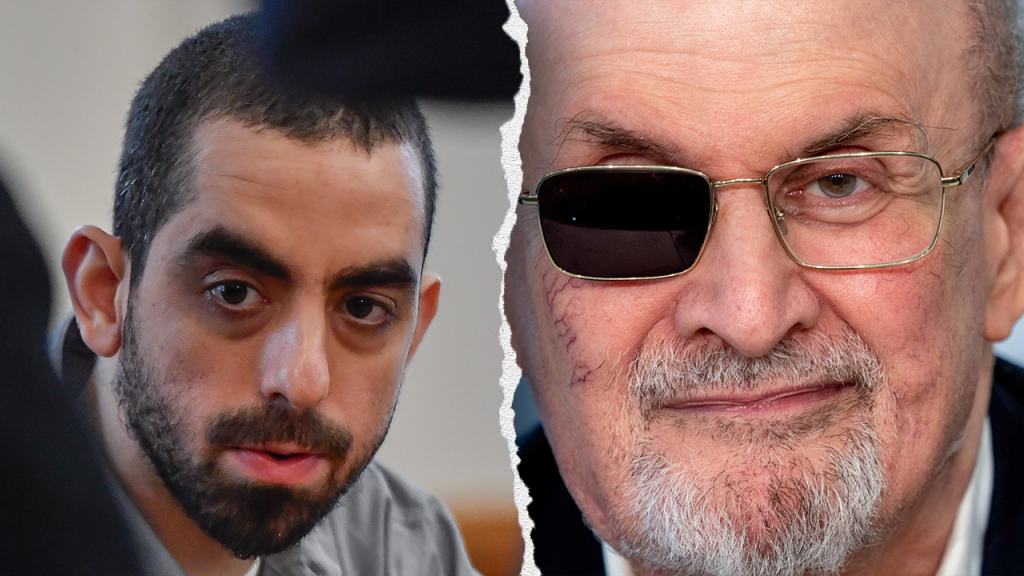A man charged with the stabbing of esteemed British author Salman Rushdie has been sentenced to a prison term of 25 years, the maximum possible sentence for his crime. Hadi Matar, 27, was convicted earlier this year of attempted murder and assault stemming from the knife attack that seriously injured Rushdie during a public event in 2022. The sentencing highlights the ongoing concerns surrounding freedom of expression, security for public figures, and the cultural tensions surrounding Rushdie’s controversial works.
| Article Subheadings |
|---|
| 1) Details of the Attack |
| 2) Matar’s Background and Charges |
| 3) The Impact on Salman Rushdie |
| 4) Society’s Reaction to the Sentencing |
| 5) Ongoing Legal Matters and Implications |
Details of the Attack
On August 12, 2022, Salman Rushdie was attacked while preparing to deliver a lecture at the Chautauqua Institution in western New York. The incident occurred in a crowded auditorium, shocking the audience present. Matar lunged at Rushdie with a knife, delivering multiple stab wounds that resulted in devastating injuries. Medical reports later revealed that Rushdie suffered injuries to his liver, arm, and one eye, leading to his vision being permanently impaired. Immediately following the attack, Rushdie was airlifted to a medical facility in northwestern Pennsylvania, where he underwent surgery and remained hospitalized for nearly three weeks, highlighting the life-threatening nature of his injuries.
Matar’s Background and Charges
Hadi Matar, born in 1995 and raised in New Jersey, was apprehended at the scene of the attack. He faced multiple charges, including attempted murder and assault. During the trial, the prosecution presented evidence illustrating Matar’s premeditated assault on Rushdie. Furthermore, he was convicted not only for the attack on Rushdie but also received an additional seven-year sentence for assaulting another individual who intervened during the attack. Matar, despite being found guilty, remains defiant, claiming to the court that Rushdie “wants to disrespect other people” and accused him of bullying.
“He wants to be a bully,”
Matar stated, further complicating his narrative for the court.
The Impact on Salman Rushdie
The repercussions of the attack on Salman Rushdie extend beyond physical injuries. In interviews following the incident, Rushdie has expressed the psychological toll of the attack, revealing a fretting awareness of mortality that he describes as having intensified. Furthermore, Rushdie reflects that the attack bore a resemblance to threats he has endured since the publication of his controversial novel, “The Satanic Verses,” which led to widespread protests and calls for his death from several factions. Rushdie illustrated the moment of the attack as a historic event, indicating a surreal acknowledgment of his attacker. He noted,
“It felt like something coming out of the distant past and trying to drag me back in time.”
Through these reflections, Rushdie illustrates the ongoing fear for his safety and the broader implications of living under threats against free expression.
Society’s Reaction to the Sentencing
The sentencing of Hadi Matar has elicited a variety of responses from around the globe. Advocates for freedom of speech have largely welcomed the maximum sentence as a necessary measure against violence aimed at curtailing expression. Many view the attack as a potent reminder of the risks that artists and public intellectuals can face when confronting controversial topics. The incident also sparked renewed discussions about the limits of artistic expression and the societal obligation to protect those who dare to challenge prevailing narratives. Further complicating public sentiment, reactions have varied depending on cultural and political affiliations, with some expressing sympathy for Matar’s views, while others overtly condemn the underlying ideologies that motivated the attack.
Ongoing Legal Matters and Implications
In addition to the state charges, Matar faces federal terrorism charges, to which he has pleaded not guilty. As the legal process unfolds, the implications of the attack on issues of political expression and societal safety continue to be evaluated. Experts argue that the court’s decisions may set precedents in cases involving threats to authors and public speakers, potentially influencing future debates on freedom of expression. The legal complexities surrounding Matar’s case further expose underlying tensions in how society navigates artistic expression, individual rights, and safety in an increasingly polarized environment.
| No. | Key Points |
|---|---|
| 1 | Hadi Matar was sentenced to 25 years for attacking Salman Rushdie in August 2022. |
| 2 | Rushdie sustained life-altering injuries, including loss of vision in one eye. |
| 3 | Matar faces federal terrorism charges in addition to state convictions. |
| 4 | The attack reignited conversations around freedom of speech and safety for artists. |
| 5 | Public reaction to the sentencing reflects varied opinions on expression and societal violence. |
Summary
The case against Hadi Matar serves as a stark reminder of the ongoing struggles faced by those who dare to question or critique societal norms through their work. Salman Rushdie’s brave stance on free expression and the artistic exploration of taboo subjects have drawn hate and violence, illustrating the threats faced by many in creative professions. In the wake of the sentencing, discussions surrounding the balance between artistic freedom and societal safety are more important than ever, potentially influencing the future of free speech advocacy in an increasingly divided world.
Frequently Asked Questions
Question: What were the charges against Hadi Matar?
Hadi Matar faced charges of attempted murder and assault due to the knife attack on Salman Rushdie and was later sentenced to 25 years in prison.
Question: How did Salman Rushdie respond after the attack?
Rushdie communicated the psychological and physical impact of the attack, emphasizing a newfound awareness of mortality while reflecting on the historical context of threats against him.
Question: What is the ongoing situation regarding Matar’s legal matters?
Beyond the state sentencing, Matar still faces federal terrorism charges, which he has pleaded not guilty to, complicating the legal proceedings surrounding the attack.
